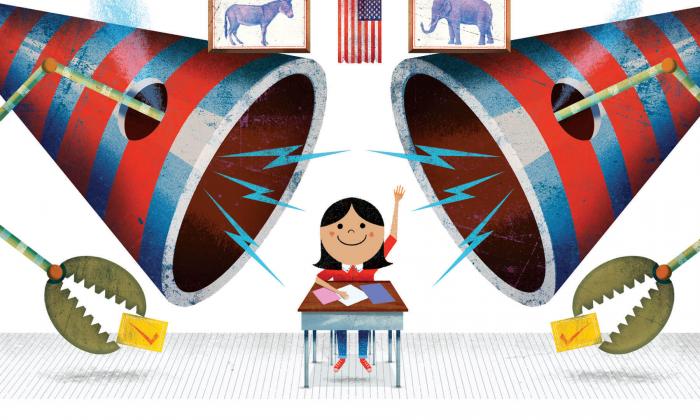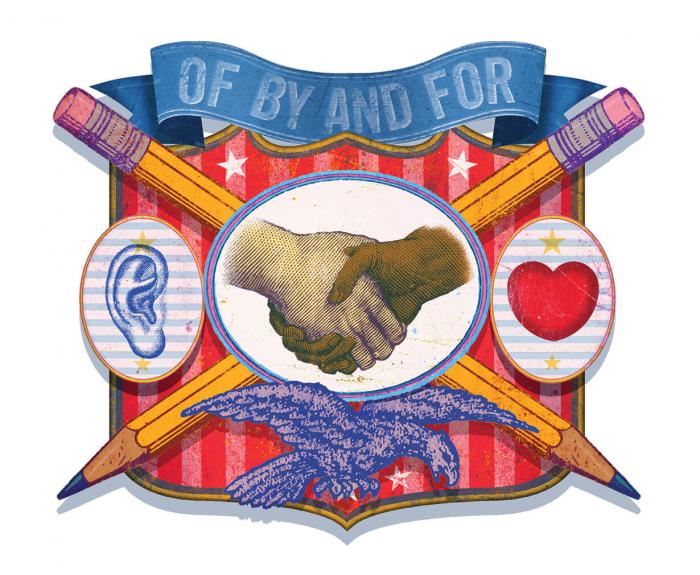Elections can evoke a wide range of emotions: from fear and anger to passion and hope. Try these tips to help you process your own emotions and remain objective this fall.

Keep Politics Out and Values In
Take time to pay attention to your own feelings. Ask yourself: Can I leave my feelings about the election behind when I enter my classroom? What feelings do I have? Do I have ways to cope with my feelings?
Three ways forward:
- Carve out time and space. Even if it is just a few minutes, stop and think about how current events make you feel. Journaling is a great way to do this.
- Talk with adults outside the classroom about your opinions and emotions. Taking care of your feelings on your own time makes it less likely you’ll vent to or be triggered by students.
- Make a list of core values and democratic ideals for your classroom. Here are some to get you started:
I will...
Defend Equal Voice
Every student gets to speak and deserves to be heard.
Teach Democracy
This is a classroom of, by and for the students.
Make My Classroom Safe
We will establish norms that create a safe environment for all students.
Ensure Fairness
I will speak up when I hear or see bias, exclusion, prejudice and injustice.
Publicly commit to these values in your classroom and encourage students and colleagues to commit to them, too.
This election season, pledge to put kids first by resisting divisive rhetoric, and encourage your school community to do the same. Check out our “Speak Up for Civility” contract and pledge.

We’ve Seen This Before
Mudslinging, scare tactics, name-calling, lies and promises that can’t be kept aren’t new in 2016. They’re persistent features of U.S. presidential campaigns.
Past campaigns show that, even when the political rhetoric gets outrageous, the checks and balances of our constitutional system support the democratic process. Here are five elections in which participants became notorious for their “bad behavior.”
1800 This campaign’s dirt was dished by surrogates—mainly publishers of extremely partisan newspapers—who didn’t care too much about facts. John Adams’ supporters called Thomas Jefferson an atheist, a “half-breed” and a libertine. Jefferson’s claimed that, if elected, Adams would lead the country into war with France. Jefferson won, and power was successfully—and peacefully—transferred from one party to another for the first time.
1828 Opponents charged that John Quincy Adams had gambling devices in the White House and, as ambassador to Russia, had pimped for the tsar. Adams’ followers claimed that Andrew Jackson’s wife, Rachel, was a bigamist and a “convicted adulteress,” his mother a prostitute and Jackson himself a murderer.

1860 Abraham Lincoln’s campaign poked fun at Stephen Douglas, saying he “talks a great deal, very loud, always about himself ... [and is] about five feet nothing in height ... .”
1928 Herbert Hoover won in a landslide, partially because his opponent, Al Smith, was Roman Catholic. Republicans claimed that Smith was building a secret tunnel between the United States and the Vatican in Rome and would take orders from the Pope if elected. Protestant preachers told congregations that a vote for Smith “was a vote for the Devil,” and a KKK flier warned that all Protestant children would be declared illegitimate.
1960 John F. Kennedy also faced a whispering campaign about his Catholicism and silenced the critics only after making a speech where he said he was an American first. He stoked fears, too, claiming that the country was weak because of a “missile gap” with the Soviet Union. It didn’t exist.
Questions to Ask Yourself
- What will I say if a student asks me how I am voting?
- What will I do if I hear a student say something I know is untrue?
- How will I respond when students repeat something inflammatory they’ve heard at home or on social media?
- How will I respond if students label one another (wing-nut, extremist, radical, etc.)?
- How will I approach other teachers who are pushing their political views on students?
Community Buy-in
Once you have committed to upholding values in your classroom, share these values with your colleagues, administration, families and the community at large. Find common ground to promote both civil discourse and civic engagement.
Basic rules for civil community discussions:
- Listen intently to what others are saying.
- Back up assertions and ideas with evidence.
- When refuting an argument, restate the argument being challenged; then, state your objection supported by evidence.
- Allow everyone to speak and be heard.
- Build in debriefing sessions.
Tips for sharing these values with your community:
-
Ask to present these ideas in a faculty and staff meeting.
-
Create an online pledge around the ideas mentioned above, and have students, families, community members and school staff sign it.
-
Nurture civil discourse as a central part of your school culture, even during nonelection years.
Election 2016 Resources
Back in the spring, we asked teachers about how the election was affecting them, their students and their schools. Here is what we learned:
- More than two-thirds reported that students—mainly immigrants, children of immigrants and Muslims—have expressed concerns or fears about what might happen to them or their families after the election.
- More than half saw an increase in uncivil political discourse.
- More than one-third observed an increase in anti-Muslim or anti-immigrant sentiment.
- More than 40 percent reported being hesitant to teach about the election.
Educators also told us what kinds of skills and tools they need to teach about the election. Here’s a snapshot:
Countering Bias
- Have facts at the ready to counter stereotypes.
- Provide positive portrayals of people from targeted groups.
- Help students talk about their own experiences. Recognize and respond to bias.
Civic Activities
- Reassure students that their voices matter.
- Encourage students to participate in civic life.
- Teach about media literacy and how messages appeal to emotions.
- Insist that students support their claims and make reasoned arguments.
Getting Along
- Practice active listening skills.
- With students, establish ground rules for discussion.
- Foster a classroom culture that values diversity. Invite students to take the perspective of others.

Specific tools and additional recommendations for creating civil classrooms can be found in our web package.